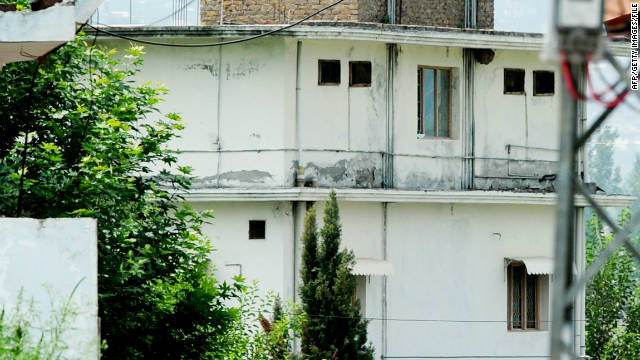
- Peter Bergen: 6,000 documents seized from bin Laden compound are revealing
- He says they paint a portrait of a man convinced he could reverse U.S. policy
- Bin Laden's private musings show he was focused on tiny details
- Bergen: bin Laden worried that too much damage had been done to al Qaeda's brand name
Editor's note: Peter Bergen is CNN's national security analyst and the author of "Manhunt: The Ten-Year Search for Bin Laden From 9/11 to Abbottabad," from which this essay is adapted.
(CNN) -- There is no better way for historians to assess Osama bin Laden's thinking and the real state of al Qaeda as it was understood by its leaders in the years after 9/11 than the "treasure trove" of more than 6,000 documents that were recovered by the U.S. Navy SEALs who raided bin Laden's compound in Abbottabad, Pakistan, a year ago.
In those documents we hear bin Laden speak in his own voice, unaware, of course, that one day his most private musings would end up in the hands of the CIA.
The documents paint a portrait of a man who was simultaneously an inveterate micromanager but was also someone almost delusional in his belief that his organization could still force a change in American foreign policies in the Muslim world if only he could get another big attack organized inside the United States -- something some of his subordinates were quite skeptical about given al Qaeda's diminished capabilities.
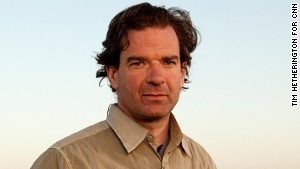
In the course of reporting a new book about the 10-year search for bin Laden after 9/11, senior U.S. administration officials allowed me to review hundreds of pages of declassified -- but as yet unpublished -- memos from the Abbottabad "treasure trove." I examined a variety of memos that were written by bin Laden himself and also memos that his subordinates had written to him, or to others.
The memos paint a picture of an organization that understood it was in deep danger from the American drone shrikes in Pakistan's tribal regions that had been decimating its leadership since summer 2008.
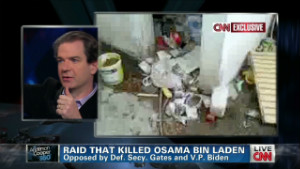 Exclusive access to bin Laden's compound
Exclusive access to bin Laden's compound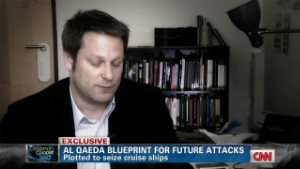 Does al Qaeda pose a threat to cruises?
Does al Qaeda pose a threat to cruises?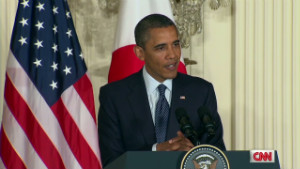 The politics of killing Osama bin Laden
The politics of killing Osama bin Laden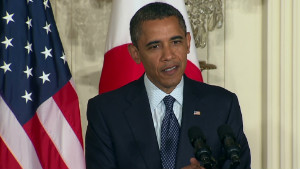 Obama not 'over celebrating' OBL's death
Obama not 'over celebrating' OBL's death They show bin Laden hatching improbable schemes to attack the United States, while he was deeply involved in the minutiae of the internal affairs of both al Qaeda's core group in Pakistan and its regional affiliates in the Middle East and Africa. And they also show that bin Laden well understood that al Qaeda's brand name was in deep trouble, in particular, because the group and its affiliates had killed so many civilians.
On August 7, 2010, bin Laden wrote to Mukhtar Abu al-Zubair, the leader of the brutal Al-Shabaab militia in Somalia, telling him that Al-Shabaab ("the Youth") would be better off if it did not declare itself publicly to be part of al Qaeda. Bin Laden advised, "If asked, it would be better to say there is a relationship with al Qaeda, which is simply a brotherly Islamic connection, and nothing more."
Bin Laden explained to the Shabaab leader that al Qaeda's affiliate in Iraq had attracted many enemies by adopting the al Qaeda name. He also pointed out that it would be better for fundraising purposes if Shabaab didn't identify itself as being part of al Qaeda, because businessmen in the Arab world "who are willing to help the brothers in Somalia" would be more likely to do so if they thought they were not supporting al Qaeda directly.
Al Qaeda, "the base" in Arabic, was the name that the group had given itself when it was founded in Pakistan by bin Laden in 1988. Now the leader of al Qaeda was advising his followers to steer away from using the term.
Bin Laden also advised members of Shabaab to try to avoid killing civilians, as they were then doing in battles in and around Mogadishu's key Bakara market, and rather to focus their attacks on African Union troops as they arrived or departed at the Mogadishu airport. Given bin Laden's own record when it came to ordering the deaths of civilians, this solicitude for the citizens of Mogadishu is somewhat ironic.
Follow @CNNOpinion on Twitter and Facebook.com/cnnopinion
So badly tarnished had the al Qaeda brand become that bin Laden noodled with changing the name of his group. In an internal memo, bin Laden pointed out that "[President] Obama [says] that our war is not on Islam or the Muslim people, but rather our war is on the al Qaeda organization. So if the word al Qaeda was derived from or had strong ties to the word 'Islam' or 'Muslims,' or if it had the name 'Islamic party' it would be difficult for Obama to say that."
Bin Laden went on to nominate some possible new names for al Qaeda. "These are some suggestions: Monotheism and Jihad group, Monotheism and Defending Islam Group, Restoration of the Caliphate Group ... Muslim Unity group." None of these suggestions were exactly catchy and the group did not rename itself.
Bin Laden's principal conduit to his organization was Atiyah Abdul Rahman, a Libyan militant of about 40. Viewed by officials in the West as no more than a mid-tier terrorist, Rahman was actually bin Laden's chief of staff. In a 48-page memo to Rahman written in October 2010, bin Laden told him that al Qaeda's longtime sanctuary in Pakistan's tribal areas was now too dangerous because of the campaign of American drone strikes there. The CIA had launched a record number of strikes into the tribal regions during 2010. Bin Laden wrote, "I am leaning toward getting most of our brothers out of the area."
Bin Laden advised his followers not to move around the tribal regions except on overcast days when America's all-seeing satellites and drones would not have as good visibility of the area. He complained that, "the Americans have great accumulated expertise of photography of the region due to the fact they have been doing it for so many years. They can even distinguish between houses that are frequented by male visitors at a higher rate than is normal."
Bin Laden urged his followers to depart for the remote Afghan province of Kunar where he himself had hid after escaping from U.S. forces at the Battle of Tora Bora in eastern Afghanistan in December 2001, explaining that "due to its rough terrain and many mountains, rivers, trees, it can accommodate hundreds of the brothers without them being spotted by the enemy."
He was constantly urging holy war to his followers, but when it came to his own family bin Laden was privately advocating something quite different. He advised that his 20-year-old son Hamza should leave the drone-infested Pakistani tribal regions to further his religious training in the Persian Gulf kingdom of Qatar, which happens to be, per capita, the richest country in the world. Bin Laden added that if two of his other sons, Othman and Mohamed, should ever leave Iran, where they were living in exile, he would also advise them to steer clear of Pakistan's tribal areas. (Bin Laden noted that one of his sons, Ladin, had already been allowed to exit Iran to travel to Syria).
According to the documents recovered in the Abbottabad compound, the spectacular set of self-inflicted mistakes by al Qaeda's affiliate in Iraq played heavily on the minds of bin Laden and his top advisers. They complained internally that al Qaeda's campaign of attacks against Iraqi Christians had not been sanctioned by bin Laden.
To the leaders of al Qaeda in the Arabian Peninsula based in Yemen, bin Laden urged that they not kill members of the local tribes, a tactic that al Qaeda had frequently employed in western Iraq, which had provoked a tribal uprising against al Qaeda that began in 2006 and had dealt a large blow to the group's fortunes in Iraq. "Learn from their mistakes," bin Laden admonished.
Al Qaeda's leaders wrote to Hakimullah Mehsud, the leader of the Pakistan Taliban on December 3, 2010, to warn him to suspend his campaign of attacks against Pakistani mosques and markets, which had killed hundreds of Pakistani civilians.
Although the Pakistani Taliban is an independent conglomeration of Taliban groups, al Qaeda was seeking to control their tactics and stop their counterproductive killing of Pakistani civilians. That isn't to say that al Qaeda's leaders had suddenly morphed into humanitarians. At one point in the letter to Mehsud, they wrote, "We're sending the attached short list on what is acceptable and unacceptable on the subject of kidnapping and receiving money. We hope that you and the Mujahedeen in Pakistan will approve it."
In his isolated final years, bin Laden became a micromanager, admonishing his Yemeni group that its members should always gas up and eat heartily before they embarked on road trips so that they wouldn't have to stop at gas stations and restaurants monitored by government spies. And he advised al Qaeda's North African wing to plant trees so they could later use them as cover for their operations:
"Trees would give shade and freedom to move around especially if the enemy spies from the air." It's safe to assume that this arboreal advice was simply ignored. At one point bin Laden even told his chief of staff that he preferred that any money sent to him be in Euros.
Bin Laden had long been disciplined, secretive and paranoid and he warned his lieutenants to be careful with any contacts with journalists. "Keep in mind that journalists may be involuntarily monitored in a way that they do not know about either on ground or by satellite. Especially Ahmad Zaidan of Al-Jazeera [the Al Jazeera bureau chief in Pakistan]. It's possible that a tracking device could be put in one of their personal effects before coming to a meeting."
Bin Laden sometimes gave guidance to his deputies so bizarre that they must have read it while scratching their turbans in bemusement. He complained that Faizal Shahzad, the American citizen of Pakistani heritage who had tried to blow up an SUV in Times Square on May 1, 2010, had broken the oath of allegiance he had sworn to the United States, and tut-tutted that "We do not want the Mujahedeen to be accused of breaking an oath." Bin Laden kept pressing his lieutenants for more attacks on America, but now they couldn't recruit naturalized U.S. citizens to carry out those missions. Huh?
Until the end, Bin Laden remained fixated on attacking the United States, writing to the leader of his affiliate in Yemen, "We need to extend and develop our operations in America and not keep it limited to only blowing up airplanes."
He urged that Yemenis who had visas for the United States be recruited for operations there. And he reminded his Yemeni followers that killing Americans was the priority rather than killing Yemeni soldiers or policeman, so the United States would be forced "finally to withdraw from our countries and stop supporting the Jews." He also warned his group not to get overly ambitious. "The people of Yemen are not really ready for a government formed by al Qaeda."
Bin Laden told his deputies that killing President Obama was a high priority as well as then-commandier in Afghanistan Gen. David Petraeus, but not to bother with plots against Vice President Joe Biden, then-Defense Secretary Robert Gates, or then-Chairman of the Joint Chiefs Adm. Mike Mullen.
As the 10th anniversary of 9/11 approached, bin Laden, always very conscious of his own media image, got down in the weeds with his media team about how best to exploit the impending coverage of the anniversary. He suggested reaching out to Abdel Barri Atwan, a leading Palestinian journalist based in London, as well as the veteran Middle East correspondent Robert Fisk of the British Independent newspaper, both of whom had done interviews with bin Laden in the past. He also mused about doing a TV interview with CBS, which he regarded as the "least biased" of the American TV channels.
In response, an al Qaeda member, likely the American recruit Adam Gadahn, wrote bin Laden a critique of the various American news channels that is worth quoting at some length: "As for the neutrality of CNN in English it seems to be in cooperation with the government more than the others, except Fox News of course ... I used to think that MSNBC channel might be good and neutral, but it has lately fired two of the most famous journalists, Keith Olbermann and Octavia Nasr, [who, in fact, left CNN] ... ABC Channel is all right, actually it could be one of the best channels as far as we're concerned. It's interested in al Qaeda issues, particularly the journalist Brian Ross, who specializes in terrorism. The channel is still proud of its interview with the Sheikh [bin Laden in 1998]."
A June 2009 letter sheds light on the murky question of what kind of relationship al Qaeda has enjoyed with the Iranian government since the fall of the Taliban. For many years one of bin Laden's wives and a number of his children lived in Iran under some form of house arrest as well as some leaders of al Qaeda, such as the military commander Saif al-Adel.
A bin Laden lieutenant wrote to bin Laden "With regards to the Iranian relationship and the problem with our detained brothers, we bring good news. They released a new group of brothers in the last month."
The writer goes on to name several men the Iranian government had recently released.
The writer alludes to al Qaeda having abducted Heshmatollah Attarzadeh-Niyaki, an Iranian diplomat, in late 2008 near his home in the western Pakistani city of Peshawar. After holding the diplomat for more than a year, the militants quietly released him back to Iran in the spring of 2010.
Pakistani intelligence officials believe this was part of a deal that finally allowed some of bin Laden's family to end their years of house arrest in Iran.
Follow us on Twitter @CNNOpinion
Join us on Facebook/CNNOpinion



{ 0 comments... Views All / Send Comment! }
Posting Komentar